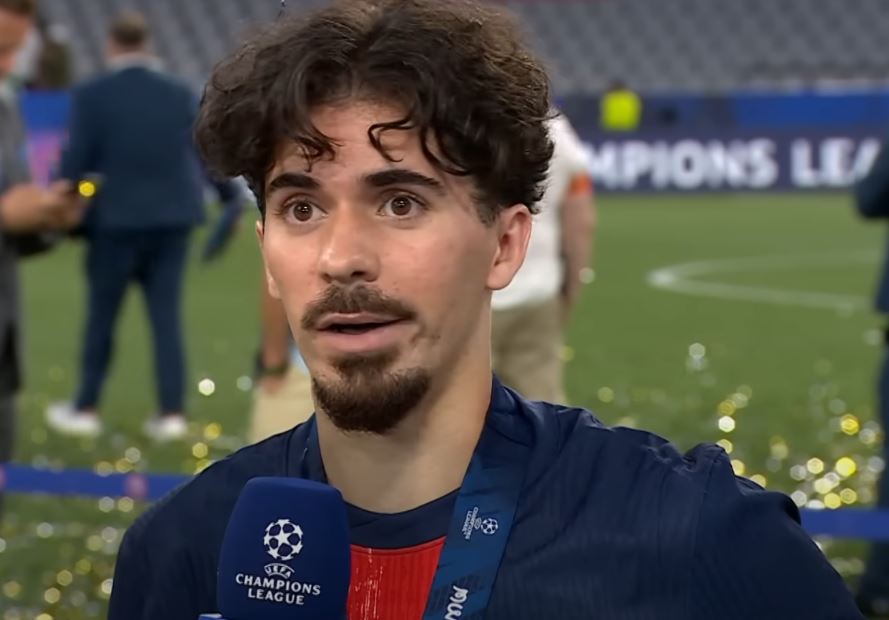
Vitinha, who is only 1.72 meters tall, has subtly changed the definition of influence in professional football. After the game begins, his height—which is frequently cited in comparison to the physically intimidating midfielders surrounding him—becomes surprisingly inconsequential. His size isn’t just controllable; it’s a strength, especially when combined with his agility, dexterity, and exceptionally good decision-making under duress.
The evolution of Vitinha has been particularly dynamic. He didn’t back down when a Benfica-affiliated youth setup rejected him in his early years for being physically unimpressive. He rerouted instead. After enrolling in Porto’s academy, he concentrated on developing his anticipatory movement, short-passing rhythms, and spatial awareness. Later, when adjusting to high-stakes situations like the Premier League and Ligue 1, that quietly developed perseverance would prove especially helpful.
Vitinha – Height, Career, and Influence
| Attribute | Detail |
|---|---|
| Full Name | Vítor Machado Ferreira |
| Known As | Vitinha |
| Date of Birth | February 13, 2000 |
| Place of Birth | Santo Tirso, Portugal |
| Height | 1.72 meters (5 feet 8 inches) |
| Weight | 64 kilograms |
| Nationality | Portuguese |
| Position | Midfielder |
| Current Club | Paris Saint-Germain (PSG) |
| Shirt Number | 17 |
| Senior Career | FC Porto, Wolverhampton Wanderers (loan), PSG |
| National Team | Portugal |
| International Caps | 27 (as of March 2025) |
The topic had changed by 2022, when Paris Saint-Germain activated his €41.5 million release clause. The speed at which Vitinha could split lines with his passes or regain possession with noticeably better accuracy caught the attention of onlookers more than his height. Because of his small size and incredibly low center of gravity, he was able to change direction quickly, frequently leaving taller opponents to react seconds too late.
He was still adjusting in his first few months at PSG. However, his rapport with Marco Verratti and his ability to consistently complete passes—sometimes above 90%—made him an especially creative deep-lying playmaker in every game. Many people anticipated a learning curve, but Vitinha breezed through it. His rapid assimilation into a squad renowned for its internal politics and high standards showed that he was just as emotionally resilient as technically skilled.
His height was criticized, particularly during difficult times in 2023 when team dynamics were harmed by a rumored altercation with Lionel Messi during training. However, the question of whether he could lead a midfield room full of alpha figures was the focus of the criticism, not his height. However, a new chapter started when Messi and Neymar left. In addition to starting frequently by the 2024 season, Vitinha was the team’s main penalty taker, vice captain, and, in Luis Enrique’s words, “a conductor in cleats.”
He scored nine goals and provided five assists during that season, his most productive total to date. He played in high-pressure matches, such as PSG’s quarterfinal Champions League comeback against Barcelona, where his vision and composed demeanor enabled them to unexpectedly overcome a deficit. Despite being much shorter than most players on the field, he further demonstrated his tactical value in the final against Inter Milan by setting up Désiré Doué for the opening goal.
Vitinha’s use of timing and anticipation as a weapon rather than physical force is what makes him so captivating. He positions himself before the opponent even considers the ball during quick transitions. Additionally, his compactness enables him to swiftly duck into duels during defensive recovery, exerting pressure without resorting to physical force. His pressing patterns are very effective and frequently result in turnovers in high zones, which is a valuable resource that contemporary managers are always looking for.
Vitinha remains incredibly dependable off the ball. When he’s on the field, PSG hardly ever loses midfield control thanks to his endurance, game reading, and reliable positional coverage. He stands tall during games because of his cognitive speed, even though his 1.72m height is only mentioned in passing in every profile. Indeed, Thierry Henry once likened his game intelligence to that of Iniesta and Xavi, two legendary players renowned for their subtle tempo control but never for their aerial skill.
Vitinha’s impact on the Portugal national team has increased dramatically over the last two years. Despite fierce competition from seasoned players like Bruno Fernandes and Bernardo Silva, he started at Euro 2024. In Portugal’s first game, he was named man-of-the-match for his ability to link play, control midfield density, and dictate tempo. Even though he doesn’t win headers very often, he does win moments, and that’s an important distinction.
Vitinha is a particularly useful model in the context of contemporary football, where coaches are looking for high-output players regardless of frame and analytics have advanced quickly. Midfield authority is no longer determined by height. Efficiency, intelligence, and positional sense—qualities he possesses naturally and consistently—are what count. Being the tallest is not his goal. He is attempting to be the smartest, and it seems like he is succeeding.
His impact goes beyond the field as well. Being multilingual, well-liked by teammates, and humble in interviews, Vitinha has become a unifying force in PSG’s multicultural locker room. He bridges the divide between generations, styles, and expectations by performing consistently and communicating honestly. More than just an athletic ascent, his journey from being written off as “too small” to masterminding games is a reminder that greatness frequently begins when someone has the courage to believe in what others don’t.
